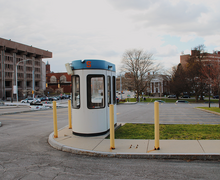Republican health care solutions do not save money, cover more people
On Tuesday, Mr. James Paul wrote an entertaining but misleading article regarding bipartisanship, in which he portrays Thursday’s health care summit as ‘political theater of the first order.’ He presents three commonly held conservative misconceptions: that the current legislation is radical, that no attempts have been made to incorporate Republican ideas and that Republicans are offering substantive policy options that will help fix our nation’s broken health insurance industry.
On average, the U.S. pays nearly twice what other advanced countries pay for substandard care, according to the World Health Organization. We also have about 47 million people with no insurance at all and many more with insurance that can be cancelled due to pre-existing conditions, so companies can save money on coverage just when a person needs it most.
When President Obama took office, he wanted to protect the health and welfare of his citizens. To do this, he tasked Congress to devise a health care reform bill that curtailed medical cost inflation, helped insure more Americans and ended the abuses of insurance companies in denying claims for ‘pre-existing conditions.’
Mr. Paul posits the notion that the administration is attempting to ‘jam’ through a bill that is radical in nature. The current legislative language – by which I am referring to the Senate’s version of the health care bill – is based partially on conservative ideas. A truly ‘liberal’ plan would be single-payer, as is used in the United Kingdom and Canada. Currently, Democrats have a plan that solidifies the place of private health insurance, and there’s nothing that screams conservative quite like privatized entitlement reform.
What emerged from Congress was comprised of a health insurance mandate, subsidies to those who cannot afford insurance, regulations on the health insurance industry to ensure quality and Medicare savings measures to help assure that the legislation adds nothing to the national debt. This doesn’t seem radical at all to me, but that’s probably because my home state of Massachusetts implemented many similar reforms years ago at the behest of Republican stalwart Mitt Romney. His reforms have been pretty effective and popular, so much so that the Senate used a bunch of them in its bill. How is it radically liberal this time around?
Now, many Republicans are saying that the cuts to Medicare used to pay for the bill threaten care for senior citizens. Well, the Medicare cuts which Republicans deride and with which they scare their elderly constituents originally come from the GOP. In 1995, it was Republican Newt Gingrich who shut down the government in a bid to force Clinton to accept Medicare cuts.
Finally, Mr. Paul contends that interstate purchasing of health insurance and tort reform are useful strategies. Well, interstate purchasing without broad national regulation allows companies to set up in states without strong regulation and gyp customers across borders, while reasonable tort reform isn’t enough to fix our broken health care system. I don’t mean to mischaracterize the Republican platform by pointing out the inefficacy of the two solutions offered by Mr. Paul, so let’s look at the actual Republican plan for health care reform, offered as a substitute by Rep. John Boehner to the Affordable Health Care for America Act. According to the Congressional Budget Office, by 2019 we will have almost the same percentage of Americans uninsured as we do now and it will not even save as much money deficit-wise as the current reform proposal! So the Republican solutions don’t save money in the long run and don’t cover more people while costing hundreds of billions of dollars. How is this even useful?
So why are Republicans against a bill full of their own ideas? Probably because they know they won’t be able to take credit.
Luke Lanciano sophomore political science major
Published on February 22, 2010 at 12:00 pm





